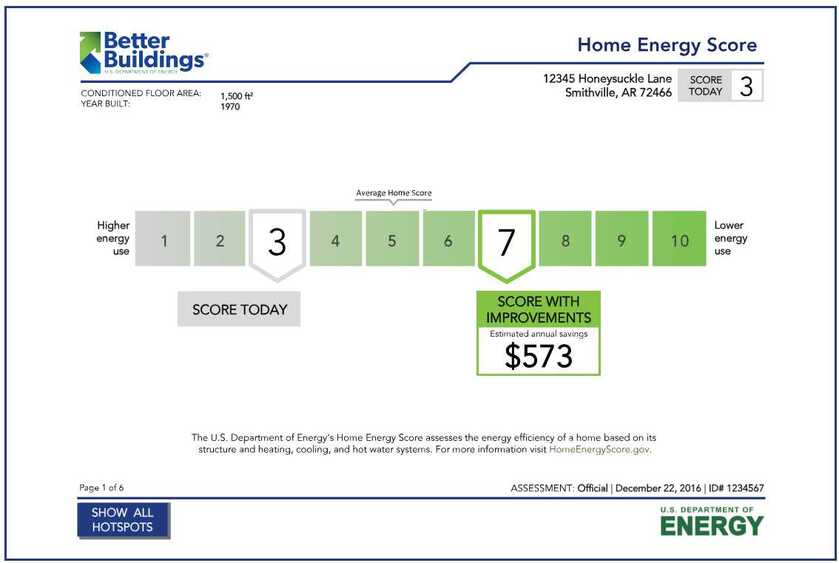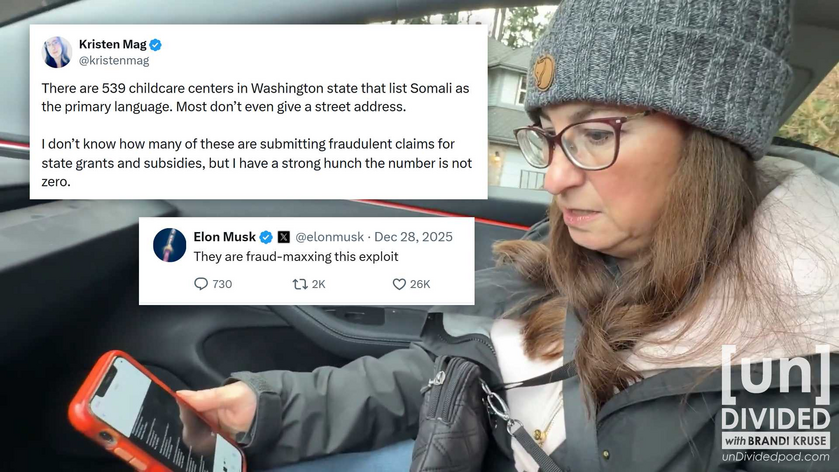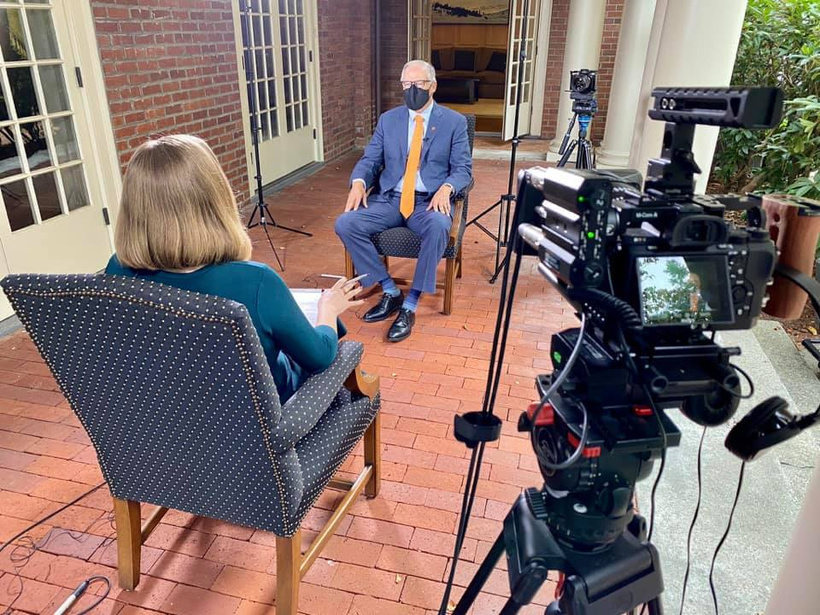About the author: Kristen Magnuson is a Washington state resident and citizen sleuth who helped uncover a troubling pattern with childcare payments in Washington state that mimicked alleged fraud in Minnesota. Follow her work on X at @KristenMag.
On the morning of December 28, I settled in with a cup of coffee to catch up on the latest Minnesota fraud news. I’d heard rumblings of the scandal for weeks after County Highway and City Journal published pieces describing the schemes in startling detail.
Earlier that week, independent journalist Nick Shirley released a viral video investigating Minneapolis daycare centers, focusing on several owned and operated by members of the Somali community. His videos weren’t definitive proof of fraud, but like many Americans I was left with questions that were too big to ignore.
So, what was I going to do about it?
I’ve always had a knack for pattern recognition and making sense of data. I fully admit I’m not professionally trained in this capacity. I have an art degree. I’m just a concerned citizen who wanted to take a closer look at how our tax dollars are being spent.
Here’s how I went about uncovering suspicious activity that was later highlighted by Elon Musk, viewed by millions of people, and led to on-the-ground investigations by independent journalists (and even some legacy news stations in Seattle).
It started with a simple search
My initial efforts were not sophisticated. I simply typed ‘childcare wa’ into a search engine. I never anticipated that such a basic exercise in sleuthing would spark the local and national attention that it did.
I landed on the state website for the Department of Children, Youth, and Families (DCYF). Among other things, the site serves as a tool for families to find childcare options. It lists every provider in the state, with information on the owner, address, capacity, inspection history, and language.

I toggled the filter to show daycares participating in the Early Achievers rating program, which is a requirement for receiving state funding. From there, I filtered results to show only the daycare operators listed as speaking Somali.
Is it racist to single out one ethnicity?
The Minnesota fraud scandal had already established a clear pattern of fraud within the Somali community, resulting in multiple prosecutions and guilty pleas.
It’s not racist to explore whether similar patterns might exist in other states, too.
Consider this excerpt from Armin Rosen’s County Highway piece:
If one chooses to inhabit a fact-based world, it is impossible to ignore that the most thoroughly proven frauds, the ones that have dollar amounts and dozens of federal prosecutions attached to them, involve the distribution of social services through organizations serving Somali-Americans.
In a City Journal article, Christopher Rufo highlighted a whistleblower who reported that the Minneapolis Somali fraud ring may have a potential link to Seattle.
According to Glenn Kerns, a retired Seattle Police Department detective who spent 14 years on a federal Joint Terrorism Task Force (JTTF), the Somalis ran a sophisticated money network, spanning from Seattle to Minneapolis, and were routing significant amounts of cash on commercial flights from the Seattle airport to the hawala networks in Somalia. One of these networks, Kerns discovered, sent $20 million abroad in a single year. 'The amount of money was staggering,' Kerns said.
Ignoring evidence and patterns over concerns about being called racist is how fraud goes unreported and uncovered.
In my initial search of Somali-run daycares in Washington state, I found that of 5,046 total Early Achievers childcare providers, 539 were Somali speaking. That’s more than 10%. Census reports estimate less than .2% of Washington state’s population is of Somali descent.
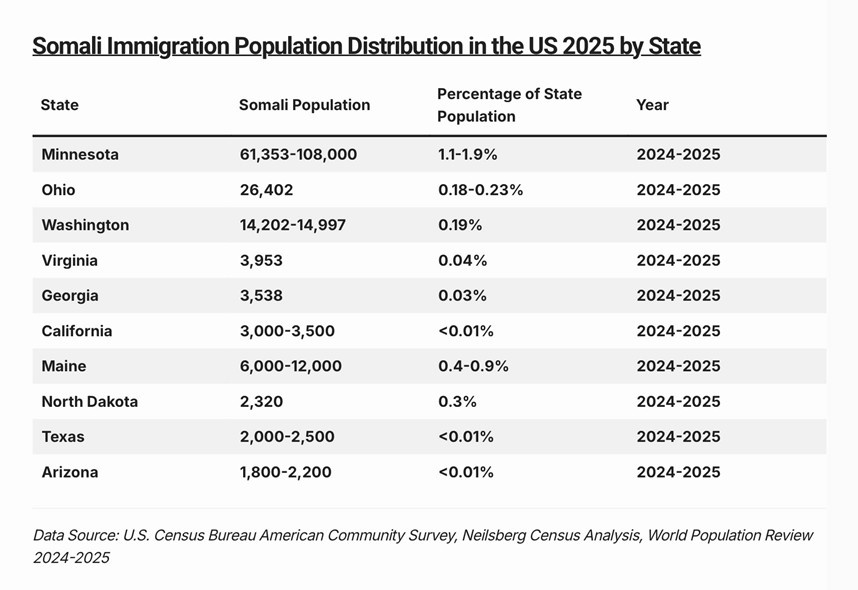
That seemed oddly disproportionate, so I posted a scrolling video on X to show what I found.
Hours later, I casually checked my notifications while at the grocery store and saw that Elon Musk replied! Millions of people were suddenly interested in what I’d uncovered with a simple search of publicly available data.

Day 1: Investigating on the ground
The day after my X post went viral, independent journalist Jonathan Choe pulled up to my house. We spent the next four hours driving all over town investigating daycares in person. I’d never done anything like it.
While state leaders, including Washington’s Attorney General and several Democrats in the legislature, would later accuse us of harassing daycare owners, we did no such thing. We were friendly. We knocked on doors. We politely asked for an application to enroll a child. Many of the people who came to the door were friendly in return.
At the first daycare, a woman invited us inside for a tour. There were activity tables with child-sized chairs, nap mats neatly stacked, art on the walls, age-appropriate books arranged on a shelf.
While everything looked legitimate, the woman would not give us an application, and I noted that only one child was present at the time.
As we ventured to other locations, we encountered some obvious red flags. Windows fully covered, no signage, and very few outdoor play areas. Most of the people who answered the door told us the owner was not there. They asked us to come back another time. Most significantly, we rarely saw or heard any kids.
At the last spot a woman spoke to us through a doorbell camera.
“We don’t have childcare,” she said.
The windows were fully covered.
Day 2: Trouble with the police
On our second day visiting Somali-run daycares listed on the state website, we met up with local journalist Carleen Johnson of The Center Square.
At one site, a woman spoke to us from behind a closed door. She wasn’t willing to give us an application. We asked a few more brief questions, thanked her, and started walking away. Shortly after, two women came out of the house to scold us.
Someone had called the police.
A responding officer assured us that we were not trespassing or doing anything wrong. The women allowed him to look inside the home, and he confirmed that there were kids inside.
The hostility was surprising. By then, a local KOMO News reporter was doing similar work – knocking on doors and asking questions. Basic shoe-leather journalism. Not harassment. Not racism.
We continued throughout the city. Some of the places we visited looked like real daycares, but many did not.
We detailed our findings on social media.
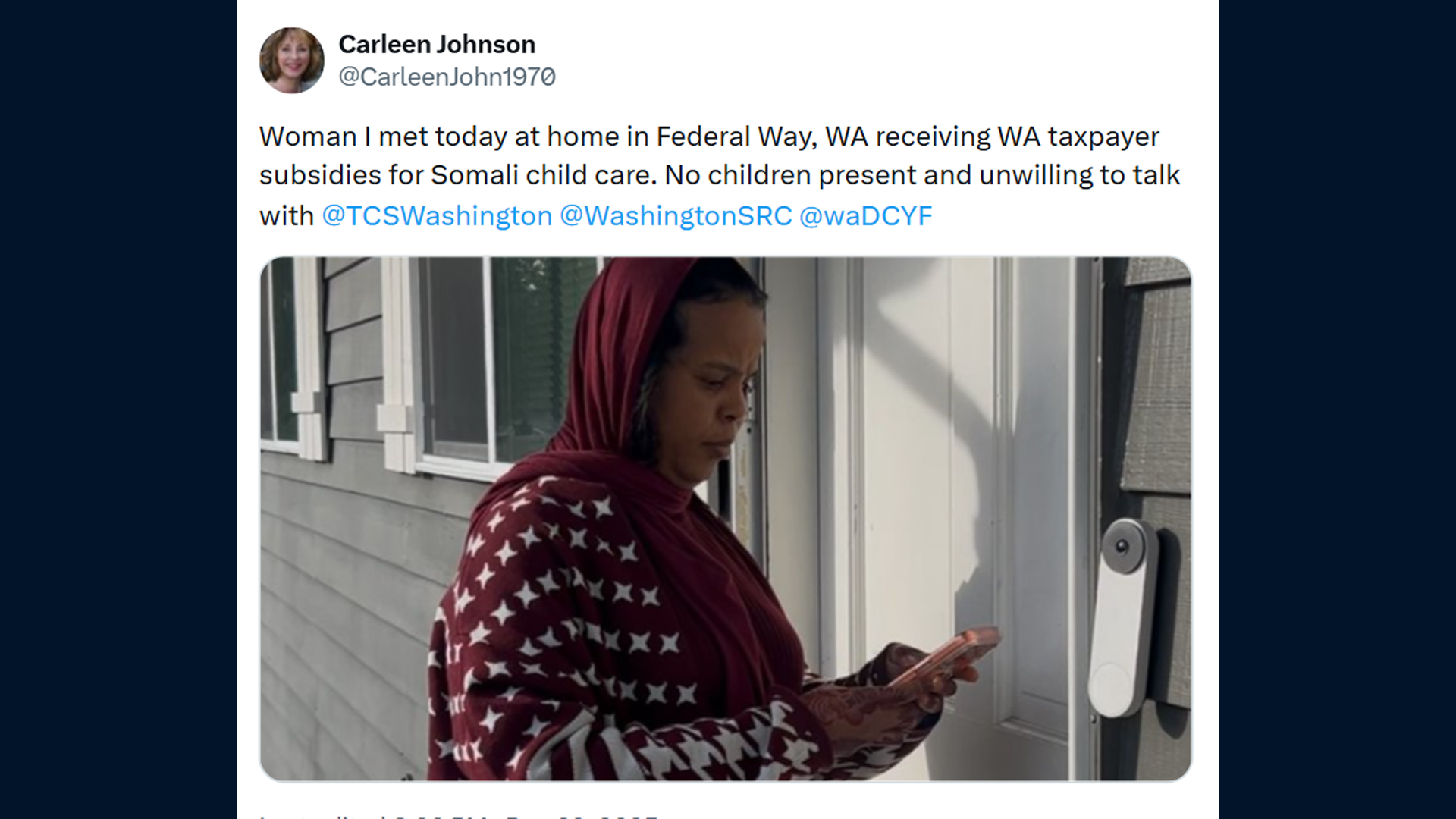
Day 3: Where has all the money gone?
We began looking deeper into the publicly available spending data on the Washington State Fiscal Information website. This site, also known as Open Checkbook, discloses provider payments by month and fiscal year. Our third day was focused on visits to providers that received significant amounts of funding.
Another independent journalist, Cam Higby, was with us as well.
Many of these small home daycares were receiving hundreds of thousands of dollars in taxpayer funds each year – some got more than a million. Keep in mind that most of these daycares have a maximum capacity of 12 children.
At one address we visited, a man spoke to us from a porch camera. He told us it was not a daycare.
Another alleged daycare was listed at the address of a small, run-down house. The windows were covered. We didn’t see or hear any children. Besides a tattered basketball hoop sitting in a mud puddle at the edge of the property, there was no play equipment. The woman who answered the door was friendly but declined to provide us with any information or an application.
Our team asked two neighbors if they had seen kids at the house and if they were aware it was registered as a daycare.
Both neighbors said no.
Yet, according to state data, the childcare provider listed at that address receives six-figure monthly payments, bringing in over $160,000 in July alone.
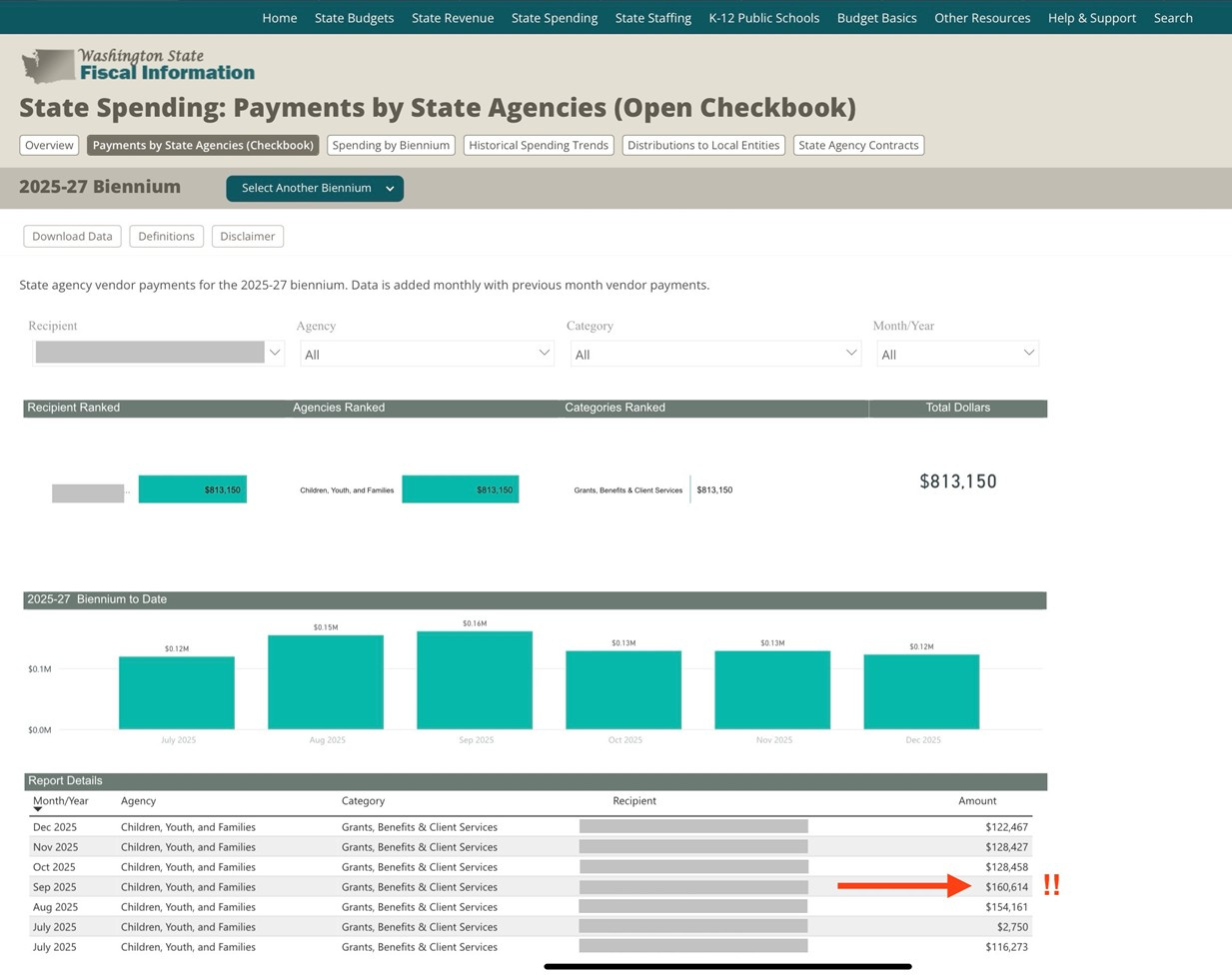
As I expanded my research, I checked out the state’s most recent audit. The Washington State Auditor’s Office reviews federal funding annually. Findings are published in a formal report, with highlights summarized on the auditor’s website. The 2024 fiscal year audit exposed significant concerns, including a whopping $416 million dollars in “unauditable” DCYF spending.
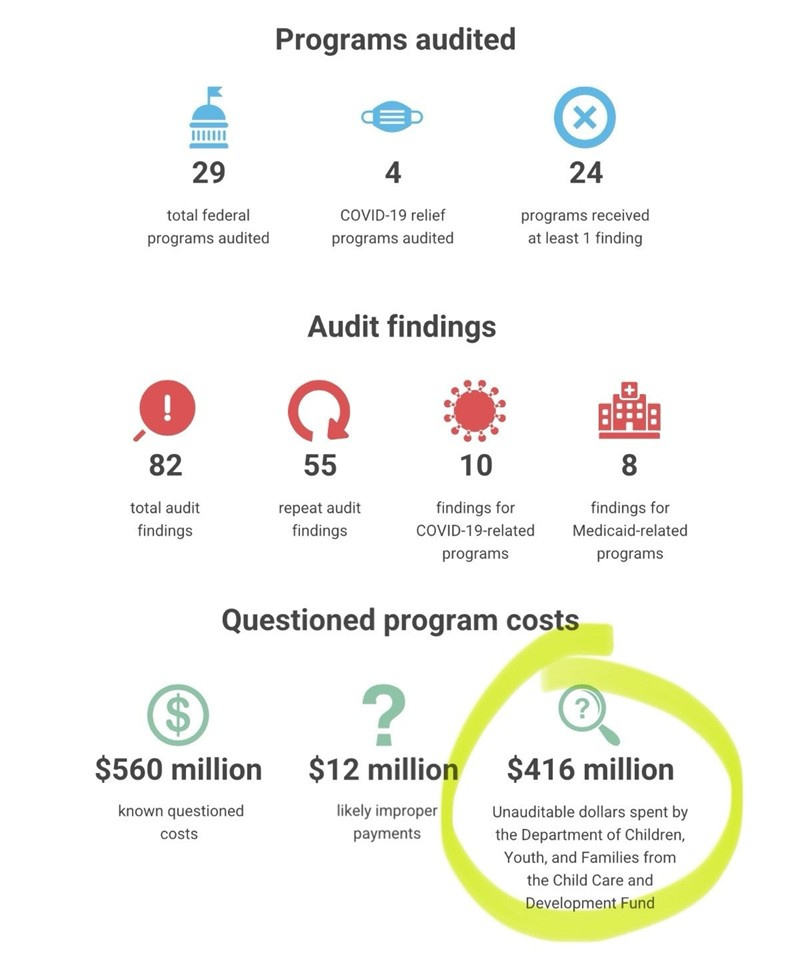
The audit revealed that DCYF repeatedly failed to comply with reporting requirements and had more audit “findings” than any other agency.
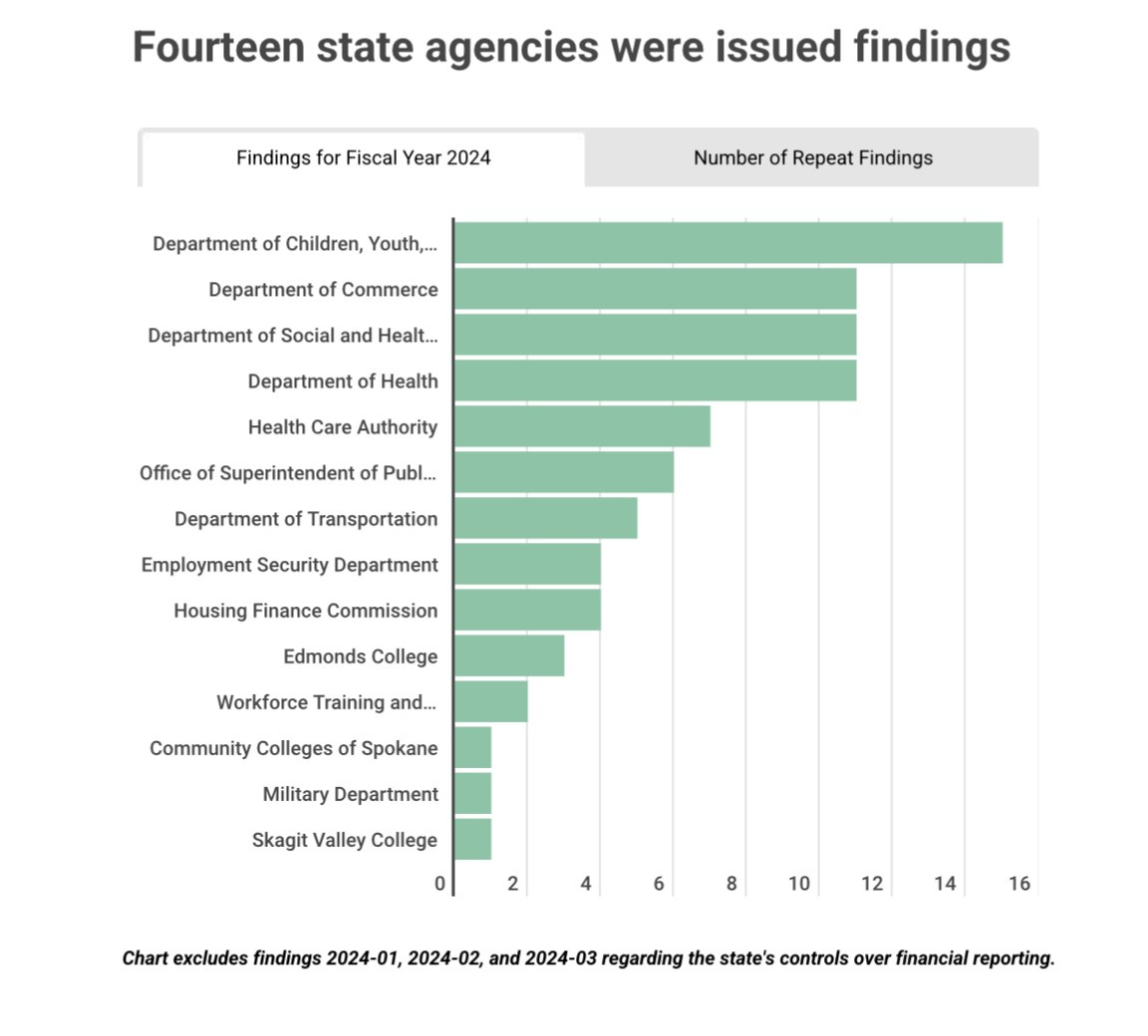
Despite being given corrective actions to take, similar findings have plagued DCYF for years.
“For the fourth year in a row, we are questioning all childcare payments from the Child Care and Development Fund at the Department of Children, Youth, and Families,” the Auditor’s Office stated.
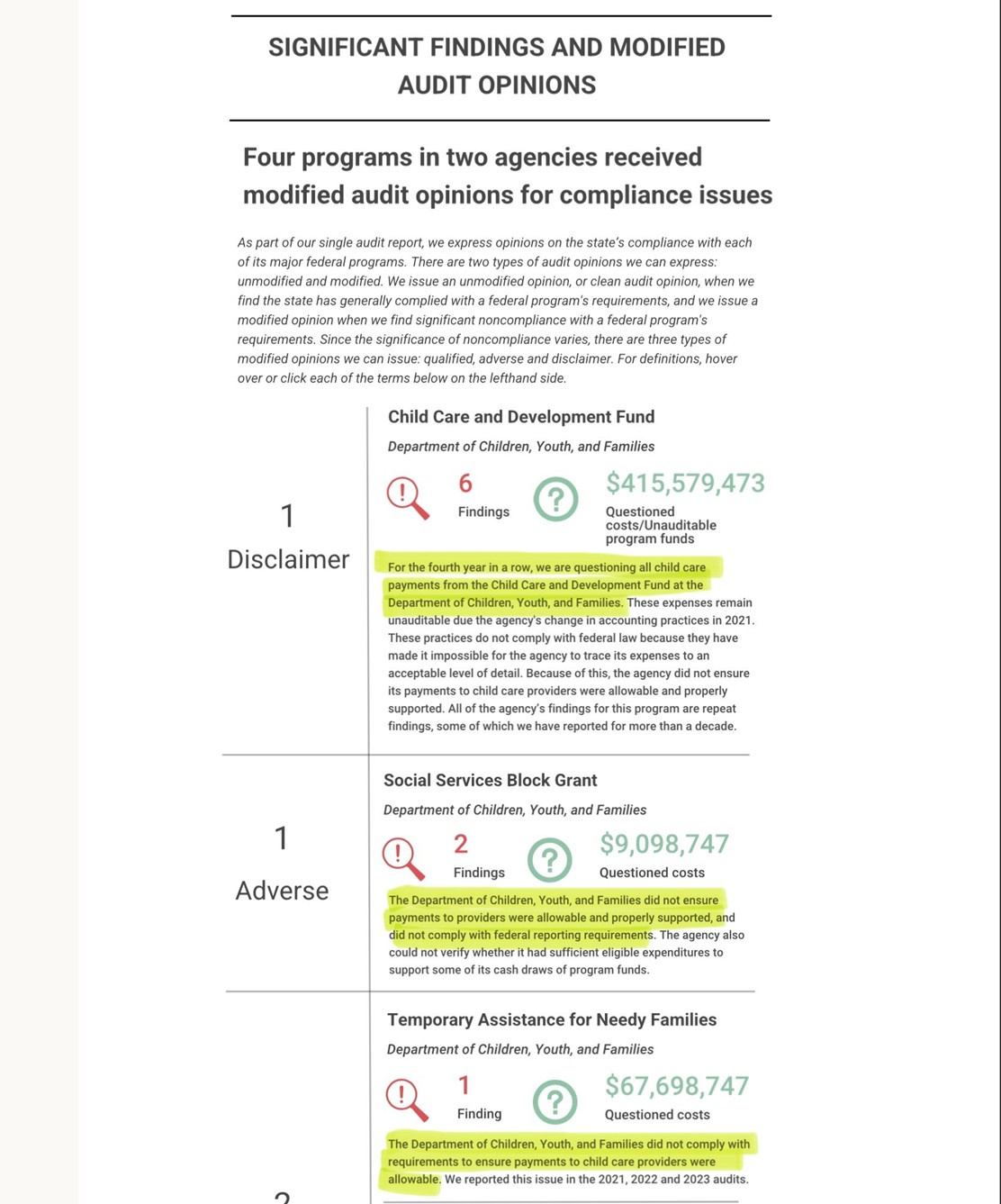
Read that again. The auditor’s office has questioned ALL federal childcare payments to DCYF for the past four years. Hundreds of millions of dollars in questionable payments.
How is such a blatant failure to follow reporting requirements or enact corrective action even allowed?
I posted a thread summarizing the audit findings on X. Before long, other news outlets and political figures were amplifying what I found.
The strange thing is that the audit findings were never private or hard to uncover. They were right there on a government website for all to see, for years. Why did it take a citizen with an art degree in Washington state to shed light on them?
Knowledge is power, but what comes next?
I want to be clear that I am not alleging fraud at any of these daycares. I do not have the tools or authority to do so. But we, as citizens, do have the tools to spot concerning patterns and question government oversight of our money.
Thanks to social media, we can amplify our concerns so that officials who do have the tools and authority to investigate can be pressured to do so.
State officials have seemingly ignored these red flags for years. Our questions and concerns are fair. We are not racists for recognizing patterns and asking questions.
Our elected officials owe us transparency – and if the media won’t demand it, we should.
About the author: Kristen Magnuson is a Washington state resident and citizen sleuth who helped uncover a troubling pattern with childcare payments in Washington state that mimicked alleged fraud in Minnesota. Follow her work on X at @KristenMag.


